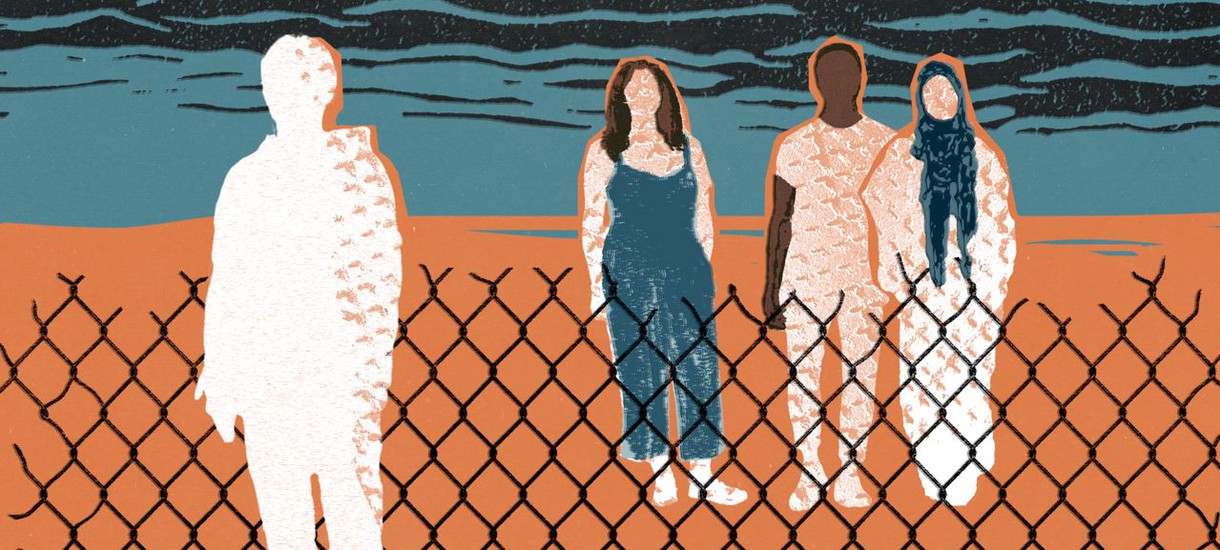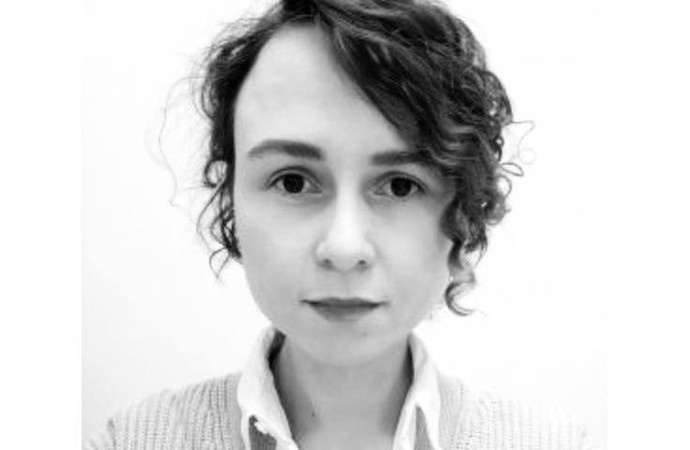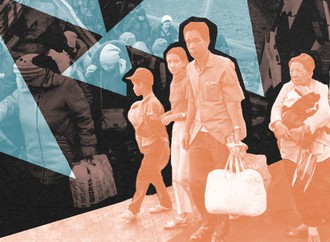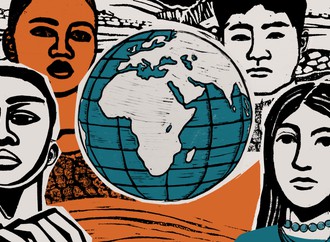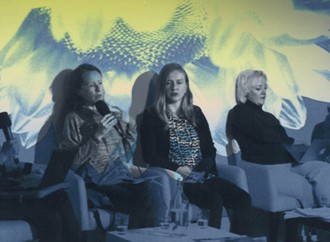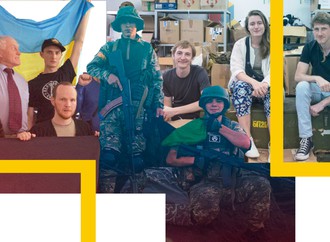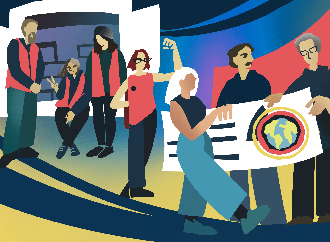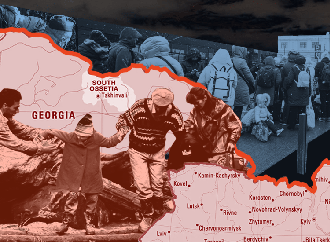Ideas discussed in this contribution were first presented at the Solidarity, Displacement & the University workshop that took place on October 13-14, 2022, in Berlin and focused on access programs for displaced learners, spaces of solidarity those programs create, and possibilities for opening up the university[1] (Cantat et al., eds. 2022) for people who have experienced displacement. I consider the topic of the workshop in light of the recent mass exodus of people from Ukraine due to Russia’s full-scale invasion. In particular, I focus on the false solidarity that exists in the broader society and, as I argue, should be countered in the classroom, specifically with the help of transformative critical education that brings together displaced learners from various regions. Encouraged by the workshop participants to share these ideas with the broader audience, I am offering them here for further discussion.
When it comes to the conditions of displaced people from Ukraine in the EU countries, this contribution is informed not only by my own experience but also by my participation as a researcher in the project on arrival infrastructures available to people from Ukraine in Vienna, which was initiated by the Institute for Human Sciences and directed by Professor Ayşe Çağlar. Still, positions expressed in this piece are of my own and do not necessarily fully reflect conclusions of the research as a collaborative scholarly work.
As February 24 recently marked a year of the full-scale war waged by Russia against Ukraine and the mass displacement of people it caused, this is a call for something that is perhaps still too soon to imagine, but if left till the end of the war (of which there is currently no end in sight) might be too late. This is a call for solidarity among displaced people, regardless of their region of origin. Of course, especially those who went through this experience recently, are probably currently preoccupied with issues of sheer survival, and for them, this call would be untimely. Still, it seems that it is better to call upon this kind of solidarity sooner rather than later because one of its ultimate aims should be an improvement of the conditions displaced people face. One might see this call as utopian; however, utopias might be helpful in imagining and stimulating social change.

Performance in Public Space Traiskirchen, Routineübung, 2022. Foto: Johanna Pianka, KÖR Niederösterreich
Positionality
I am writing about displacement from what feels to be a privileged position, as I am a Ph.D. student at Central European University in Vienna, and I became a foreign (first M.A. and then Ph.D.) student before my family and I had to flee Ukraine, where I was conducting fieldwork in February 2022, due to the war. So having a place in the foreign higher education system before experiencing displacement has given me a relative advantage in navigating the situation and the processes of emplacement in a foreign country[2] (Glick Schiller and Çağlar 2016), where my family and I found refuge.
The feeling of privilege also stems from the fact that, as a Ukrainian national, I, as well as millions of Ukrainians, was allowed to cross the EU border to escape the horrors of the war. This feeling of privilege is the reason for the sense of guilt I have had since the beginning of the war when thinking about how the narratives of the welcoming reception of people from Ukraine must have felt to displaced people from other countries. I can only imagine the pain and outrage it must have caused – seeing that some people were easily let through the same border where others had to wait for weeks and risk their lives to be able to cross. And knowing that I perhaps did nothing to contribute to this racialised and unjust treatment does not help much to get rid of the sense of guilt.
To clarify: I do not take this feeling uncritically, and I am fully aware of the fact that, first, it is not exactly my place to feel this guilt (it is the place of the Western political community), and second, that many would not necessarily consider those relatively small advantages to be privileges in a strict sociological sense. I am also aware that my feeling of being privileged might be a result of a combination of, on the one hand, survivor’s guilt and, on the other, the internalized imperative of Western social sciences (where I received most of my training) – to reflect on one’s privileges: even if you are a female third-country national fleeing war with your family and having no stable legal or economic position. Still, it is important to acknowledge that many did not have even those small advantages (advantages that might not be considered as conferring privilege in strict sociological definitions). Last winter, I had to wait behind a fence at the Hungarian border checkpoint for 9.5 hours in cold and humiliating conditions before I was eventually allowed to cross the border. Others had to wait much longer or lost their lives attempting to enter the “Fortress Europe.”
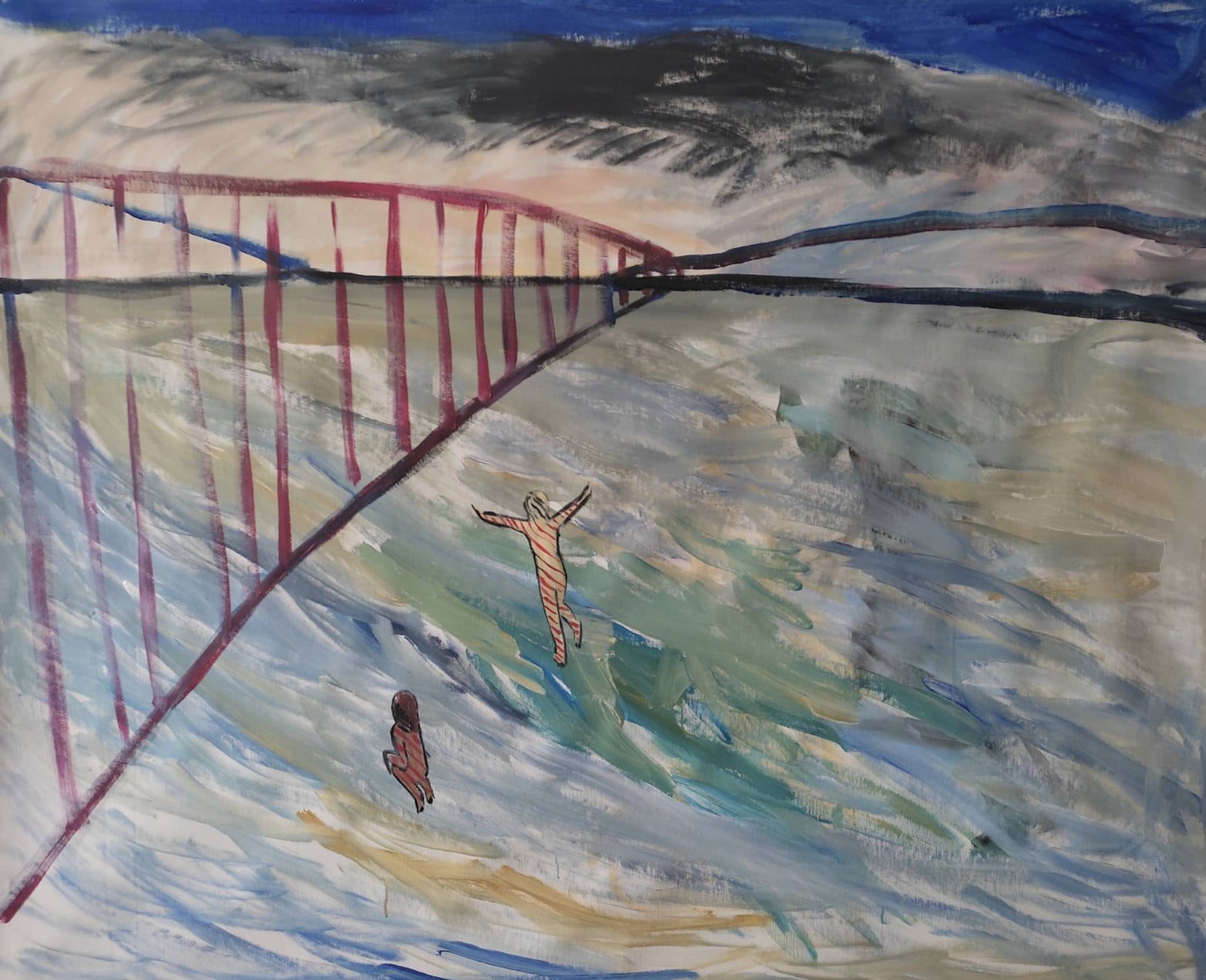
Somebody applied for a Duck Status somewhere. Artist: Kateryna Lysovenko.
Reception of displaced people from Ukraine: the case of false generosity
However, it is important to distinguish my own feeling of being privileged from the situation on the ground. Because as time goes by, the “welcoming” reception of people from Ukraine has also revealed its rather true face, and people realised that, in the long term, with the exception of a few countries, such as Germany, where the situation is more benign, they mostly have to sustain themselves on their own, with little or insufficient support from EU states. In many cases, there is a big difference between, on the one hand, the portrayal, the façade of generosity that has been widely promoted by the European media and political narratives of how Ukrainians were received, and, on the other, the conditions in which they eventually found themselves, especially in the long term. While statistics show what urgent needs mean in terms of subsistence, accommodation, and employment, what they do not convey are the difficulties and the vicious circles in which people find themselves when trying to access those things – to which they were given rights – and the actual conditions in which they live. Not infrequently, unable to make ends meet, people have preferred returning to Ukraine even though it remains unsafe. Moreover, the research on the reception of displaced people from Ukraine in Vienna in which I took part, shows that, in the long run, being placed in the new and underdeveloped framework of temporary protection (and its different implementation models at the national level) might also produce a number of vulnerabilities when compared to other statuses of international protection (refugee status and subsidiary protection).
As a result, it seems that thinking about the situation in which displaced people from different countries (including Ukraine) find themselves in Europe in terms of “privileges” is counterproductive. First, because this term belongs to the media and political narratives and does not reflect the significant differences between those narratives and the situation on the ground. Second, because the notion of privilege (or the lack of such) does not communicate the complexity and strain of the conditions displaced people from different regions face and instead, reproduces the faulty, simplistic narratives, which, in turn, pit those people against each other.
What I want to suggest is that those relative advantages that people from Ukraine seemed to receive with the temporary protection status (that is, a number of rights and the possibility of mobility within Europe) represent, to use Paulo Freire’s term, a form of “false generosity,” which, among other things, results in the preservation of the existing status quo[3] (Freire 1970: 18). In other words, one of the outcomes of this seeming generosity is that it enables the EU to preserve the current border regime and perpetuate the injustices it produces in relation to displaced people of other nationalities. In Freire’s terms, this is not true humanist generosity but a humanitarian one (Freire 1970: 28), as it simultaneously serves to maintain the current EU border regime and the general state of affairs.
To provide some context, on March 4, the Council of the European Union activated the Temporary Protection Directive, according to which the EU countries have been granting people from Ukraine temporary protection status, which is different from refugee status, and which is supposed to provide them with rights to access to the labour market, education, and healthcare. (The difficulty to realize those rights, as has been noted, is an entirely different story.) There are at least two reasons to argue that this solution eventually preserves and reproduces the current status quo and the existing EU border regime. First, even though in early October, in response to another country-wide attack by Russia, the protection status of people from Ukraine was extended till March 2024, there is an understanding that the protection is temporary and can be revoked almost at any moment, not necessarily when conditions would be appropriate for return[4] (Mencütek 2022). And second, processing displaced people from Ukraine through a different status and track of procedures, among other things, allowed the EU asylum regime to remain unaffected by the sudden increase in the inflow of people. And what could have otherwise caused the need for some adjustments, if not change, was avoided, and the European border regime remained untouched.
False solidarity
What the solution to grant Ukrainians temporary protection status also did was create one more legal fiction that, along with other categories – such as asylum seekers, refugees, or stateless persons ― enable the EU countries to control and govern outsiders within their borders. This compartmentalization of human experiences tends “to split and conceal the common dynamics of displacement”[5] (Clarke 2022: 293) and, among other things, I argue, prevents the possible forging of solidarity among displaced people. According to this divide-and-rule logic, people find themselves on different sides of the lines dividing them into various legal categories. The latter – together with the inequalities and differences in the benevolence of reception and the above discussed faulty narratives of generosity – put displaced people in different positions and prevents them from being in solidarity with each other, which would allow them to challenge the EU asylum regime more forcefully.
So, on the one hand, the different legal statuses and differences in treatment have discouraged forging solidarities with displaced people from other countries. On the other hand, there also exists what I will call “false solidarity.” What I mean by this is that, unfortunately, not infrequently, people from Ukraine tend to reproduce the widespread racialized imaginaries of displaced people from other regions. This is the view of “refugees” marked by all sorts of stereotypes regarding the circumstances of and reasons they fled their home countries, their qualities, and (un)deservingness. As our research also shows, people from Ukraine often either resist being defined as “refugees” or might accept the definition but still distinguish themselves from refugees from other countries. Instead, they describe themselves as a “(temporary/forced) displaced person,” sometimes as a “tourist” or a “guest.” That is, while people from Ukraine think of themselves as being simply in need of temporary support and shelter, they quite often imagine refugees as someone who represents “bare life”[6] (Agamben 1998).
The way they position themselves vis-à-vis other displaced people and EU citizens seems to not only emphasize the difference from the former but also the proximity to the latter. That is, as if by internalizing and echoing the racialised views and narratives and by “othering” other displaced people, people from Ukraine have been trying to become “less other,” closer, and more similar to European citizens. This, among other things, contributes to false solidarity: the solidarity where people from Ukraine often see themselves as more similar and categorically closer to EU citizens than to other displaced people.
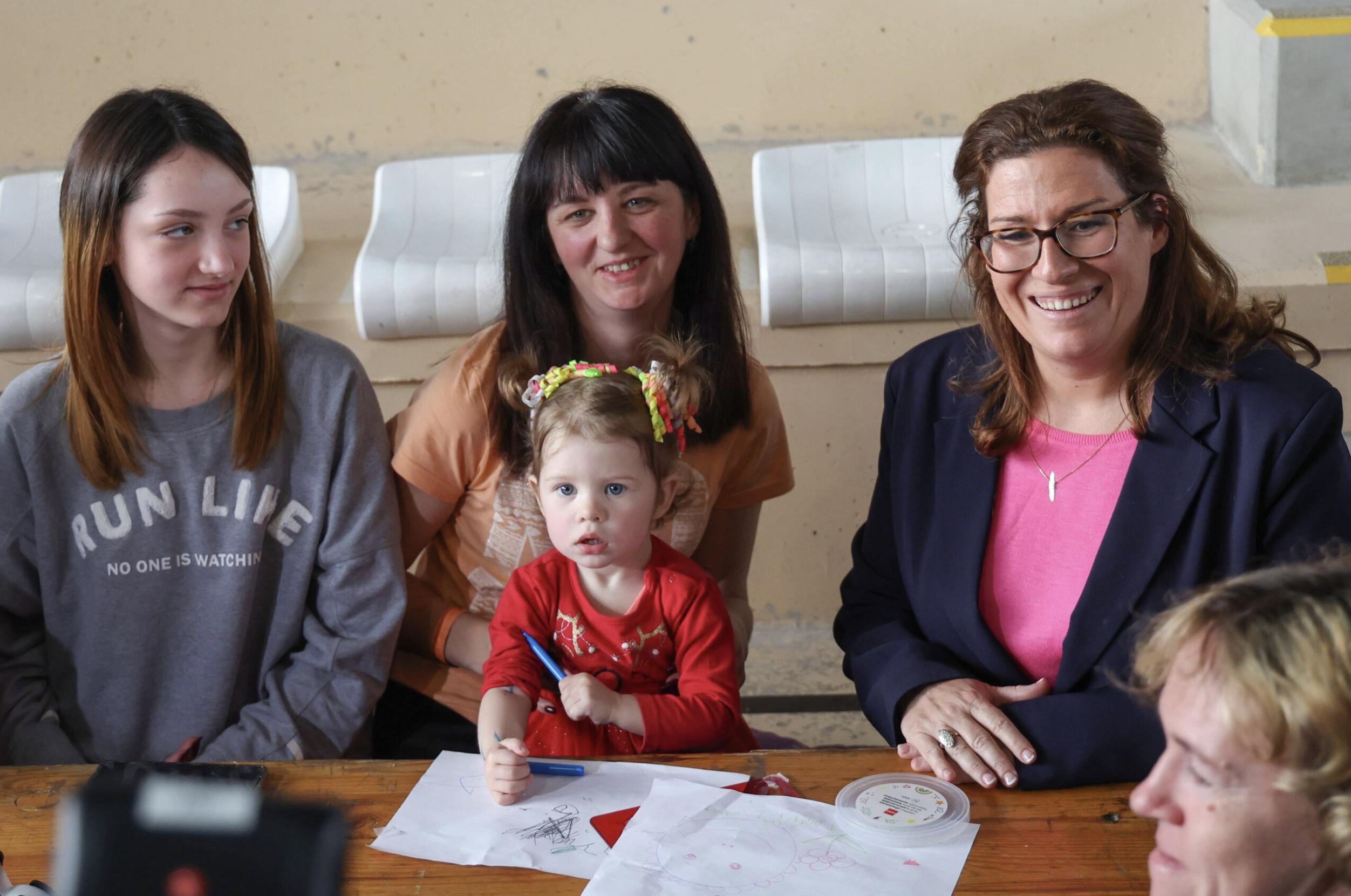
Sonia Backès, Secretary of State to the Minister of the Interior and Foreign Affairs, responsible for citizenship, at the Regional Reception Center for IDPs from Ukraine, Nice, France. Photo: SYSPEO / SIPA
Forging solidarities in the sphere of education
This false solidarity should be countered. One of the places to do that would be the sphere of education, particularly critical education initiatives (in the sense of practicing critical pedagogies) for displaced learners. One of the two reasons education can and should be a place to oppose false solidarity is that the divisions created by different legal statuses and racialised unequal treatment of displaced people should not be protracted further by education initiatives targeting learners exclusively from Ukraine. This should be countered by programs that would bring together displaced and dispossessed learners from various regions to, hopefully, forge solidarities among them. The second reason is that education initiatives are particularly suitable for forging such solidarities because one can expect the effects of such initiatives to spill over and expand to broader society, at least with time.
Since the full-scale invasion by Russia started, a number of education initiatives and opportunities have emerged for people from Ukraine in and beyond the EU. Again, as with the general conditions of reception and subsistence, the reality of those opportunities is often very different from the way they are advertised. Quite often, they are not sustainable and accessible to those who need them the most, but only to the privileged few. Of course, so far, many of such initiatives and opportunities have had a character of emergency aid, offering short-term solutions and quick fixes. However, as it is becoming more and more clear that the war and the immediate threat by Russia are probably there to stay for years, it would be crucial to have education initiatives that do not create and contribute to the sense of exceptionality of people from Ukraine (but, instead, highlight the “common dynamics of displacement” experienced by people coming from different regions). Because so far, the different legal track – in which Ukrainians have been channeled by being granted the temporary protection status – has implied that they have been treated as an exception rather than a precedent: a temporary exception to the EU border regime (that leaves this regime unaffected) and not a precedent for a structural change.
Therefore, if – following bell hooks – we think about a classroom as a space of radical possibility[7] (hooks 1994: 12), it would be important to see, first, emerging education initiatives that open their doors to learners affected by displacement from various regions. And second, it would be essential to see those few sustainable education initiatives that were created specifically for Ukrainians to become inclusive to displaced learners from other countries. Because I believe such environments would enrich learners’ experience in ways nationally homogeneous classrooms never could; they could create spaces for learning about each other, understanding, speaking, and listening to each other, for critical thinking and, hopefully, solidarity.
Acknowledgements
I would like to thank Nataliya Tchermalykh and Volha Biziukova for their feedback and critique, from which this contribution has greatly benefited.
Works Cited
- ^ Cantat, Céline, Ian M. Cook, and Prem Kumar Rajaram, eds. (2022). Opening Up the University: Teaching and Learning with Refugees. Berghahn Books.
- ^ Glick Schiller, Nina, and Ayşe Çağlar (2016). “Displacement, Emplacement and Migrant Newcomers: Rethinking Urban Sociabilities within Multiscalar Power.” Identities 23 (1): 17–34.
- ^ Freire, Paulo (1970, 1993). Pedagogy of the Oppressed. Penguin Books.
- ^ Mencütek, Zeynep Şahin (2022, March 11). Ukrainian Refugees Need Security. EU’s Temporary Protection Can’t Give It. openDemocracy. (Accessed on February 27, 2022).
- ^ Clarke, John (2022). “Privilege, Plurality, Paradox, Prefiguration.” In Opening Up the University: Teaching and Learning with Refugees: 293 – 306. Berghahn Books.
- ^ Agamben, Giorgio (1998). Homo Sacer: Sovereign Power and Bare Life. Stanford University Press.
- ^ hooks, bell (1994, 2014). Teaching to Transgress. Education as the Practice of Freedom. Routledge.
